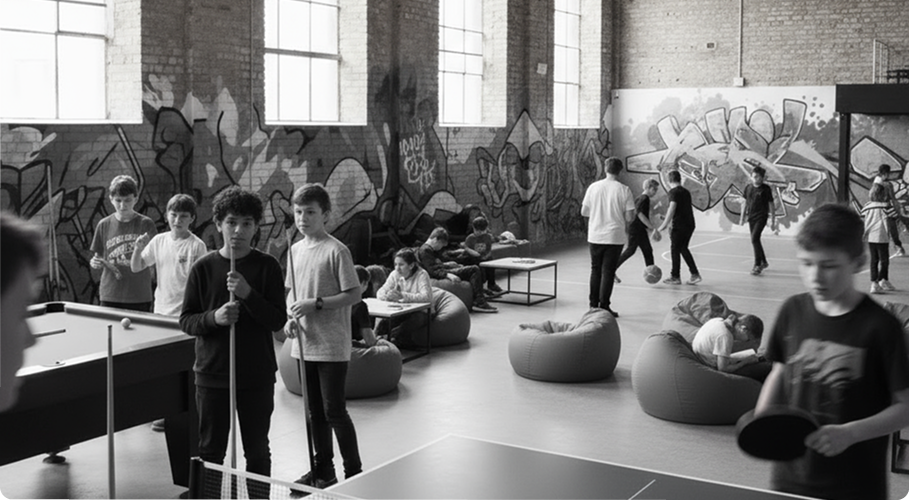As Children’s Commissioner for England, I am privileged to hear from children and young people across the country about what matters to them. Time and again, they tell me that they want places to go and fun things to do. They want welcoming spaces where they are able to play, learn, grow, build friendships and get support and advice from adults they trust.
Emma Warren’s Up the Youth Club is a powerful, timely reminder of why youth clubs matter — of where they come from and why we must fight for their future. Warren’s book is both a history and a cri de cœur. She traces the story of youth clubs from their roots in Victorian philanthropy and the industrial revolution, through the heyday of the Albemarle Report and the creative explosion of the 1970s and ’80s, to their unfortunately diminished present state.
It is a sweeping, deeply researched, and emotionally resonant cultural history that says so much about this changing British institution and what those changes say about the Britain of the time. Whether it’s the class politics of the shift in terminology from “youth leader” to “youth worker”, the birth of uniformed youth groups against the backdrop of early-20th-century nationalism, or the thousands of purpose-built and architect-designed clubs delivered in the 1960s for young people after the end of national service.
However, what makes this book so compelling is the way she uses the voices and experiences of youth workers and young people themselves. These personal stories ground the narrative in the impact that these places have had on individual lives. As one interviewee says about the birth of a Bangladeshi youth organisation in the 1980s: “When I was growing up, young Asian kids never went to youth club... We thought, ‘It’s not for us.’... Then [someone] opened one room in a church hall and said, ‘Come in, come in’... For us, it was heaven-sent.”
Warren shows us that youth clubs are not a luxury or an afterthought. They are a vital part of our social infrastructure. For generations, they have provided a space for young people to grow, to take risks, to find belonging, and to develop the skills and confidence that they need to thrive. They are places where children can access support, try new things and, crucially, be heard.
One of the most striking themes in Up the Youth Club is the role that people of faith have had in their creation and in defining their mission. Whether that’s the many youth clubs run by Methodist ministers, the YMCA’s role as a national and international network for youth work, a history of Jewish youth clubs stretching back to the 1940s in East London, or figures such as Gus John, a youth worker, writer and ex-Dominican friar.
Importantly, Warren does not shy away from the challenges. She is honest about the barriers faced by girls, by disabled young people, by those from Black, Asian and minority ethnic backgrounds, and by LGBTQ+ youth. She shows how, at their best, youth clubs are places of inclusion, where every child can feel safe and valued.
Warren’s account of the decline of youth provision in recent years is clear-eyed. She sets out, with clarity and evidence, the impact of the last decade: the loss of funding, the closure of treasured clubs, and the slow erosion of a service once relied on by millions. She is clear that this is not just a loss for young people, but for society as a whole.
As Children’s Commissioner, I have seen first-hand the consequences of this neglect. Too many children tell me they have nowhere to go after school, no trusted adults outside of their family, and few opportunities to develop the skills and relationships that will help them succeed. Investment in youth work is investment in prevention, in wellbeing, and in the future of our communities.
What I admire most about Up the Youth Club is Warren’s optimism. This is truly an optimism that I share, as I have been honoured to meet so many passionate and knowledgeable youth workers who continue to deliver incredible work for young people all over the country, despite the obstacles. Warren does not simply mourn what has been lost. She calls on policymakers, funders, and communities to recognise the value of youth work, to listen to young people, and to invest in the spaces and relationships that help them flourish.
Up the Youth Club is a testament to the power of youth work, and a challenge to all of us to do better. I echo Warren’s call: let us be a society that puts children at its heart. Let’s invest in the spaces that help our communities thrive, and ensure that every young person has somewhere safe, welcoming and inspiring to go. Emma Warren’s excellent book shows us why we must put youth clubs back at the centre of our national vision, and what is at stake if we fail.

















